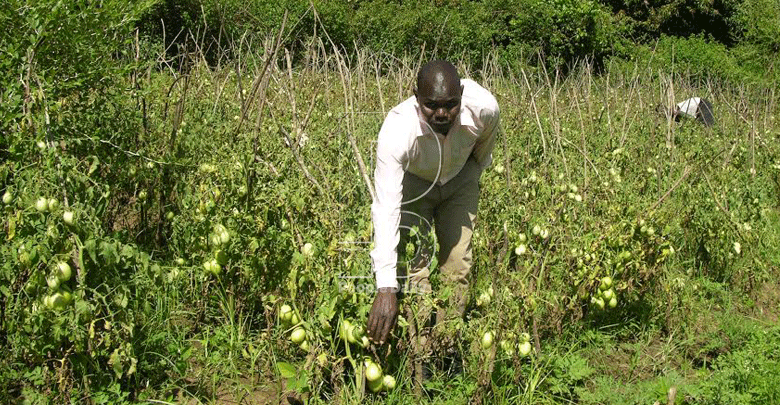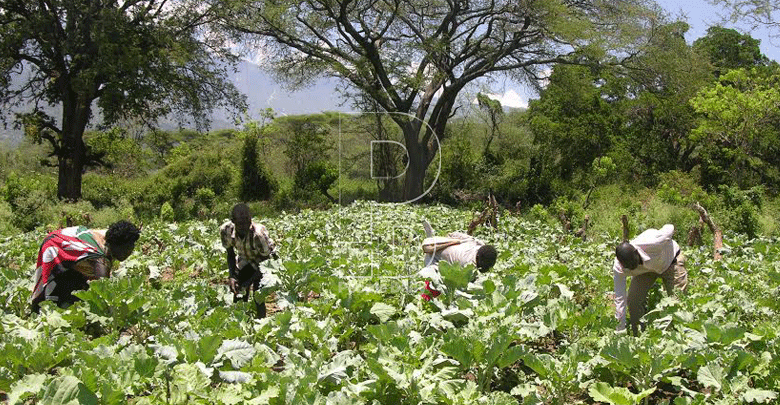Marakwet youth enjoy fruits of shared labour
By Clifford Akumu, April 20, 2021An organisation in Elgeyo-Marakwet county is encouraging young people and women, who neither own land nor are able to lease land on their own, to pull resources together and lease land collectively to grow food.
When movement was disrupted and many shops closed down during the onset of coronavirus last year, small collectives were key to remaining self-sufficient for marginalised farmers in Marakwet’s village of Kapsogom, Elgeyo-Marakwet county.
“We had sufficient grains and vegetables at home, while others in the village were seeking government support,” says 48-year-old Susan Jebet Biwot, one of the 30 members of Tulime Tujitegemee farming group, a community based organisation that brings together youth and women, who lease land collectively to do farming activities.
Dalmas Kibet, a father of three and a member of the group, echoes Jebet’s satisfaction at being food secure: “For fear of catching the virus, few shops in the village were opening. We were the only source of vegetables for the villagers,” he says.
The group has leased several acres in different areas within the community from private landowners.
But some land owners, always, after seeing rich harvest by the farmers, claim their land back.
To avoid fallouts, Kibet says, women landowners in the village were identified and invited to join the group.

The group has a total of 35 acres of which, they have allocated 10 acres of the land for green grams farming, five acres for tomatoes and grow water melons on 20 acres.
Last season, however, they only grew the water melons and tomatoes on two acres of land each, green grams on two and a half acres and kales.
Kibet says they grow drought resistant N26, fast maturing and drought resistant K26 and K20 green gram varieties.
They plant Cal-J, Aden and Onyx vtomato varieties, which are not easily infected with diseases.
“We did not plant the watermelons at the right time, we burnt our fingers by harvesting 900 kilogrammes fetching a total of Sh132,000.
We got 80 crates of tomatoes and a crate goes for Sh400 in the market,” narrates Kibet.
“We harvested six bags of 90 kilogrammes green grams, which we sold at between Sh250 and Sh300,” explains Kibet.
For women and youth in marginalised areas, such as Kapsogom or Kabaldamet areas in the county, not having access to land for agriculture affects their family’s health and nutrition.
“With group farming, we ensure food security and nutrition for landless women and youth at the household level,” says Felix Korir, one of the organisation’s founders.
The road to Kapsogom is bumpy and occasionally punctuated with undulating hills and steep slopes, so are the farming activies.The semi-pastoral community lies on dryland and receives little rainfall.
Battle field turned farms
The area is also rocked by communal clashes over land. Korir says they began the group in 2017, with the intention of helping landless youth and young women to engage in farming activities to achieve food security and avoid violence.
“The whole of this area where we are farming used to be battle field,” says Korir pointing at Koitumo Hill-that served as a watch tower by the Marakwets during cattle raids to spot their enemies before they struck.
A day hardly passed without a gun shot. “This was the valley of death,” he adds.
The group uses the water from furrows originating from the Embobut rain forest, serving about 10,000 people.
To supplement the furrow water that they use for irrigation, they have moved their farming activities to the banks of Kerio River to cushion them during dry periods.
In 2018, the group got support and training on good agricultural practices from Kenya Seed Company, Eldoret, on dryland farming.
“We were given seed packs and planted them in demonstration plots. When we submitted the reports on each and every crop, it was impressive.
Since then, we are getting a lot of support in terms of new variety of seeds from them,” Korir says.
Jairus Lagat, sales representative at Kenya Seeds Company says, “We train and give them the best choice of crops that suit the area’s climatic conditions. Crops that mature early, resistant to drought and diseases.”
How they do it
Climatic conditions favourable for green gram farming consist of annual rainfall of at least 600 milimetres annually and temperatures of 28 to 30 degrees Celsius.
It prefers well-drained fertile loam or sandy soils with a soil PH of 6.0 to 7.0.
Work is shared equally among members of the group and all decisions are discussed and made with a collective agreement.
If for any reason one member can’t come to work on a particular day, they have to make up for the lost day another time.
But there have been other challenges. “Lack of capital to purchase inputs, commitment from members, water harvesting infrastructure and market linkages for their produce continues to weigh us down in this initiative,” says Korir,
The group also has a merry-go-round where members contribute Sh200 weekly. For those who delay in payment, they are given amnesty period to update their status.
